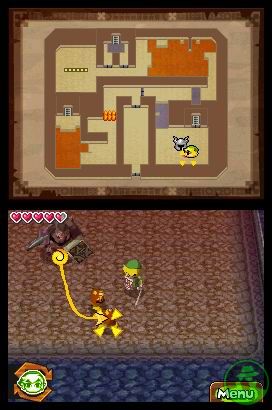By
Brian Altano |
Dec 8, 2009
Breaking tradition without breaking the formula.
GameSpy's Take
Zelda is dead -- let's just get that out of the way upfront. She's killed by a ruthless chancellor within the first few minutes of
The Legend of Zelda: Spirit Tracks, and plucky series protagonist Link is tasked with returning her ghost to her body. But don't mourn Zelda's passing just yet: Her spirit accompanies you throughout the game, a clever twist on the classic save-the-princess cliche. Spirit Tracks is another success in Zelda's cherished history, and -- assuming you can acclimate to the touch-screen controls -- it's one of the best games in Nintendo's flagship action-adventure series.
Spirit Tracks' titular gimmick (and Link's trusty travel mechanism this time around) comes via a speedy locomotive -- a polarizing inclusion that has some
Nintendo fans up in arms over a perceived technology overload. In a Zelda game. I guess all the time-travel, sub-aquatic suits, and electromagnetic hover-shoes seen in past Zelda games get free passes. But a train? Why, that's just too much.
Nonsense arguments aside, Link's new toy works much better than you might expect: The whole train-travel thing gets off to a slow start, but once your choo-choo is equipped with a cannon (and the ability to warp from track to track), things pick up a bit. The travel system is a thinly veiled guise to mask Spirit Tracks' eschewing of the series' traditional overworld, much like The Legend of Zelda: Phantom Hourglass (and its also-polarizing sailboat) before it. Given the visual fidelity that Spirit Tracks trots out, and the DS' relatively modest capabilities, the cut corners are a given -- and this is another triumph in spite of all that.
Because your train is fairly slow and limited to defined paths (whereas Phantom Hourglass offered on-the-fly nautical route customization), backtracking to already-covered areas gets tiring. A few mini-games keep you occupied as you ride; you'll defend your train with the cannon, blast open rocks to reveal hidden hares (Spirit Tracks' token collectible -- with an S&M rabbit-man as the creepy caretaker), and dodge evil blue trains with toothy faces (a micromanagement diversion that plays like a slow nod to Pac-Man). A good half of the game is spent riding the train -- one of those things that's fun the first few times, but not the 50th.
The new bit of DS gimmick-tech I
don't love, though, is Spirit Tracks' selection of microphone-controlled items. It was understandable when developers released software with mic integration when the DS launched five years ago... but to see Nintendo push "awkwardly blow air into your DS" as a gameplay element in one of the company's flagship franchises is pretty disheartening, especially when it doesn't always work when you need it to. The new Whirlwind attack gets particularly cumbersome in combat; I found myself exhaling rapidly while stabbing and slicing at the touch-screen, which I wouldn't call a fun gameplay mechanic. On the flip side, Spirit Tracks' mic-conducted wind flute feels oddly satisfying when you hit the correct combination of notes (just expect some strange looks from people on your morning commute).
If it sounds like I'm hating here, think again: Despite the goofy DS gimmicks, it's one of the series' shining moments. For one, Spirit Tracks features some of the best labyrinths and inventive bosses in Zelda history. Epic boss battles sprawl across both screens, and successful victories feel hugely rewarding -- ditto for the excellent new puzzles featured throughout. You can also opt to cleverly take notes via touch-screen input on the in-game map, just like the last time around. But unlike Phantom Hourglass, Spirit Tracks is no casual affair: The former was designed to introduce new fans to the Zelda franchise, but even seasoned veterans shouldn't expect to simply fly through Spirit Tracks. And, to quell fears, yes, Spirit Tracks features a dungeon similar to Phantom Hourglass' Temple of the Ocean King. You return to it often, but you won't have to tediously replay entire sections of it. Oh, and learn to love Link's stylus-controlled movement scheme -- it's back again, it's still great, and anyone who believes otherwise is plain wrong.

With the recent New Super Mario Bros. Wii and now Spirit Tracks, it's a joy to see Nintendo silence detractors who claim the company is only interested in making exercise simulators and brain-dead party games. Link's newest adventure is rife with hours of action and exploration, brimming with ingenious level design and deceptively smart puzzles. Twenty years on, Nintendo still manages to find ways to reinvent the franchise. Here's hoping for 20 more.
The Consensus portion of this review shall be added shortly.